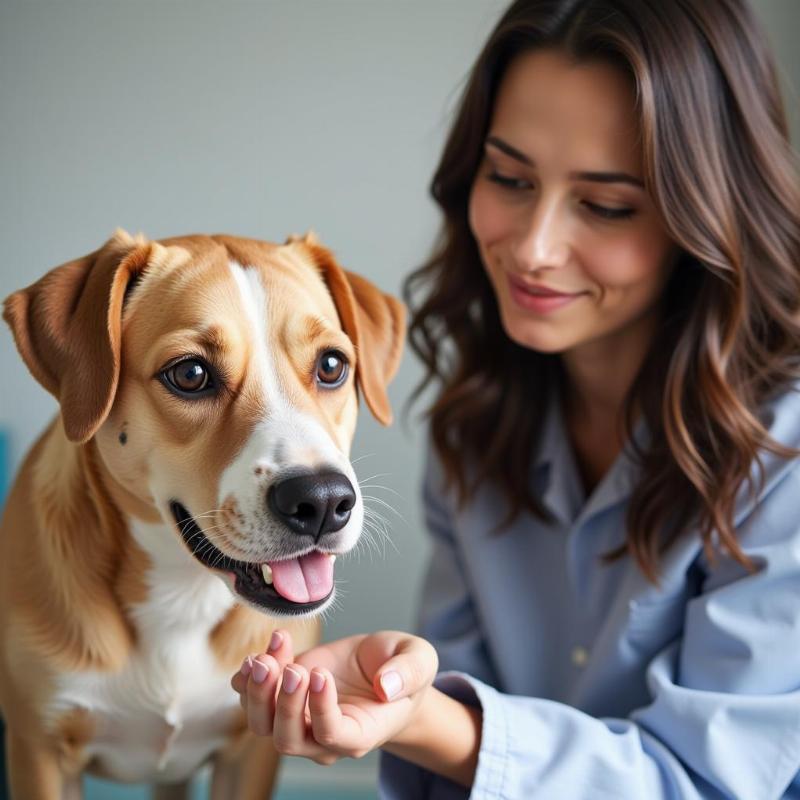If your furry friend is undergoing chemotherapy, you’re likely concerned about their well-being and also your own safety. One common question many pet owners have is: “Can a dog on chemo lick you?” It’s a valid concern, and understanding the risks involved is crucial for both you and your canine companion. This article will delve into the potential risks, precautions, and best practices to ensure a safe and loving environment for everyone during this challenging time.
Understanding Chemotherapy and its Effects on Dogs
Chemotherapy drugs work by targeting rapidly dividing cells, which include cancerous cells but also healthy cells in the body like those in the bone marrow, gastrointestinal tract, and hair follicles. This is why dogs undergoing chemotherapy often experience side effects like nausea, vomiting, diarrhea, and hair loss. These drugs are excreted through bodily fluids, including urine, feces, saliva, and vomit. This is where the concern about being licked by a dog on chemo arises.
 Dog undergoing chemotherapy licking its owner
Dog undergoing chemotherapy licking its owner
Potential Risks of Being Licked by a Dog on Chemo
While the risk of significant harm from a quick lick is generally considered low, it’s not entirely nonexistent. Chemotherapy drugs can be absorbed through the skin and mucous membranes. This means that repeated or prolonged exposure to a dog’s saliva containing chemo residue could potentially lead to absorption of the drugs into your system. This is particularly concerning for pregnant women, children, and individuals with compromised immune systems.
Precautions to Take
To minimize potential risks, it’s essential to take some precautions:
- Wash your hands thoroughly: After petting or interacting with your dog, wash your hands with soap and water, especially after any contact with their saliva.
- Avoid face licking: Discourage your dog from licking your face, mouth, or any open wounds.
- Clean up accidents immediately: Wear gloves when cleaning up any urine, feces, or vomit. Dispose of waste properly in sealed bags.
- Consider protective clothing: If you’re providing extensive care, such as administering medication or cleaning up frequent accidents, consider wearing gloves and an apron.
Managing Side Effects in Your Dog
While protecting yourself is important, remember that your dog is experiencing challenging side effects. Providing supportive care is vital during this time. Talk to your veterinarian about medications to manage nausea, vomiting, and diarrhea. Offer bland, easily digestible food and ensure your dog has access to fresh water at all times. Provide a comfortable and stress-free environment for your furry friend.
Open Communication with Your Veterinarian
Your veterinarian is your best resource throughout your dog’s chemotherapy treatment. Don’t hesitate to ask any questions or express any concerns you have about the risks of exposure to chemo drugs. They can provide specific guidance based on the type of chemotherapy your dog is receiving and your individual circumstances.
Conclusion
While the risk from an occasional lick from a dog undergoing chemotherapy is generally low, taking precautions is always recommended. By understanding the potential risks and following simple safety guidelines, you can minimize any potential exposure to chemotherapy drugs while continuing to provide love and support to your furry companion during this challenging time. Remember to maintain open communication with your veterinarian and prioritize both your dog’s well-being and your own.
FAQ
- Is it safe to let my dog on chemo sleep in my bed? While there’s no definitive answer, it’s generally considered safe as long as you practice good hygiene and prevent direct contact with saliva.
- What should I do if my dog vomits after chemotherapy? Clean up the vomit immediately while wearing gloves and dispose of it properly. Contact your veterinarian for further guidance.
- Can I give my dog on chemo any human medications? Never give your dog any human medications without consulting your veterinarian. Many human medications are toxic to dogs.
- How can I make my dog more comfortable during chemotherapy? Provide a comfortable bed, offer bland food, ensure access to fresh water, and minimize stress.
- How long will my dog need to be on chemotherapy? The duration of chemotherapy treatment varies depending on the type of cancer and the individual dog’s response. Your veterinarian will determine the appropriate treatment protocol.
- Are there any alternative treatments for cancer in dogs? Discuss potential alternative treatments, such as surgery, radiation therapy, or holistic approaches with your veterinarian.
- How can I tell if my dog is experiencing side effects from chemotherapy? Common side effects include nausea, vomiting, diarrhea, loss of appetite, and lethargy. Contact your veterinarian if you notice any changes in your dog’s behavior or health.
Connect With Beautdogs.us
Beautdogs.us is your trusted resource for all things dog-related in the US. We offer expert advice, breed-specific information, and product recommendations to ensure your furry friend lives their best life. Whether you’re a new dog owner or a seasoned pro, Beautdogs.us is your go-to source for comprehensive and engaging information on dog care and companionship. Connect with us today for personalized advice and support! Email: [email protected], Phone: +1 501-555-7529.